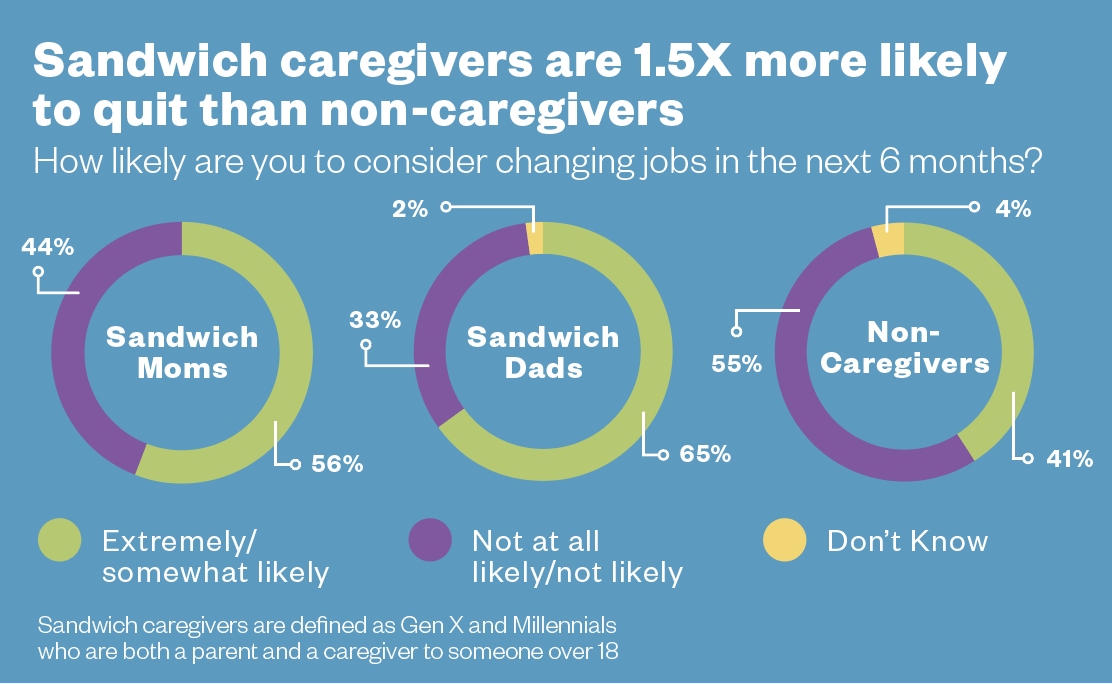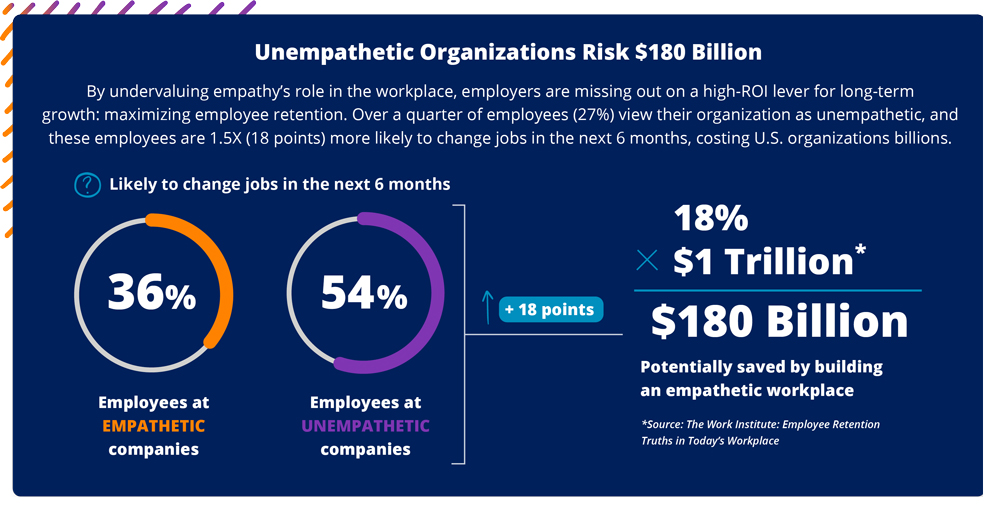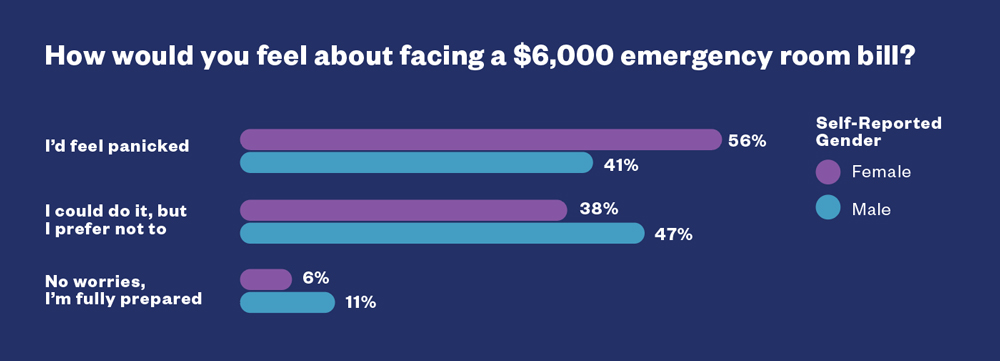I keep snacks in the car. I covet sleep. Grocery delivery is my love language. And I feel like my to-do list will outlive me.

Marcy Klipfel
Chief Engagement Officer, Businessolver
I’m not unique — I’m one of 24 million working moms in America just trying to make it all work. But as part of the “sandwich” generation, I’m not only managing my daughters’ busy teenage schedules but also caring for aging parents — and, without a doubt, it takes a mental and physical toll. Some days I’m crushing it. Other days I’m lucky if I eat lunch by 3 p.m.
For working moms, career aspirations often take a backseat to the daily reality of managing life, and for other moms my age, the juggle is amplified: navigating the healthcare system for loved ones — insurance, prescriptions, appointments, advocacy — it’s another invisible full-time job.
It’s no wonder that 56% of “sandwich moms” say they’re considering leaving their employer in the next six months, according to Businessolver’s 2025 State of Workplace Empathy report.

But it’s not just sandwich moms who have a hard time juggling it all: 65% of Gen X and Millennial sandwich dads say they’re likely to leave their employer, too, compared to 41% of non-caregivers of the same generations. In total, sandwich generation caregivers are 1.5 times more likely to change jobs compared to non-caregivers.

Why empathy is key to retaining your caregiver employees
With Millennials and Gen X representing the majority of both caregivers and the U.S. workforce, addressing their needs is a business imperative companies can’t afford to ignore — especially with many in the prime of their careers. To attract and retain this top talent, employers must look to benefits and policies that rank highly among this group and are perceived as empathetic.
Our 2025 Empathy study found that employees who perceive their workplace as unempathetic are 1.5 times more likely to leave — costing U.S. companies an estimated $180 billion in attrition. These workers also report three times more toxicity and 1.3 times higher mental health struggles, driving up absenteeism and lowering productivity.
Solving the silent caregiver epidemic with empathetic benefits
The silent strain of caregiving is pushing sandwich generation employees — especially women — to the brink. Though family-focused benefits exist, many focus on growing families (dependent care flexible spending accounts, fertility benefits, etc.). Our data reveals 70% of caregivers would consider changing their job for better mental health support compared with 54% of non-caregivers. And, according to the University of Phoenix, 66% say current benefits fail to meet their caregiving demands. For sandwich moms, employer financial support is even more crucial: 55% of sandwich moms report living in a single-income household with 52% of their paychecks going to caregiving costs.
It’s time for employers to lead with empathy, creating support systems that protect retention, mental health, and career growth.

Here are 4 ways to support your “sandwich” moms and caregivers:
1. Financial well-being
Businessolver’s 2025 Benefits Insights Report showed 56% of women, compared to 41% of men, would feel panicked about a $6,000 unexpected expense. And only 6% of women say they’re prepared for such a large out-of-pocket expense.
What employers can do: Pay transparency and equity are key to helping women and caregivers make ends meet, alongside career coaching and advancement opportunities. Financial support programs like 401(k) plans and financial education programs are likewise especially important for women, whose savings typically lag compared to men. In fact, according to our data, only 25% of women say they’re able to always save for a rainy day.

2. Workplace flexibility
PTO is a must-have for 61% of caregivers, but flexibility around when and where they work also ranks highly: 51% of caregivers would be willing to take a pay cut to work remotely. Of those that already work in a remote or hybrid capacity, 61% would leave their job if required to work in the office full-time. But employers often overlook the connection between flexibility and mental well-being: 76% of caregivers say the option to work remotely is important for their mental well-being.
What employers can do: Afford employees with greater autonomy over when and where they work, to whatever extent possible — from flexible hours to four-day weeks and job sharing. Flexibility isn’t just about better time management; it’s one of the most cost-effective benefits an employer can offer as healthcare costs skyrocket. And if flexible workplaces are not an option, consider offering a benefit that supports caregivers by helping them offload some responsibilities to caregiving support providers, such as Grayce.
3. Mental health benefits
In total, 56% of caregivers versus 44% of non-caregivers say they’ve experienced a mental health issue in the past year. But when we look at the types of mental health issues, female caregivers are more likely to report higher incidences of nearly every mental health condition, with depression (66%) and anxiety (81%) the most common.
What employers can do: Improve awareness for employer-sponsored mental health benefits like employee assistance programs, which are vastly underutilized. Leaders and direct managers play important roles in creating safe spaces and transparent dialogue to encourage benefits usage and dispel mental health stigma, which remains a significant barrier to usage.

4. Benefits access and awareness
Navigating benefits and the healthcare system is hard enough for yourself — now layer on the complexities of Medicare for aging parents. While our data shows 86% of employees are confused about their benefits, they’re also willing to adopt technology that helps them choose and use their benefits: 64% use decision support at enrollment when it’s available, driving 3 times more lift in voluntary benefits enrollment that supports the financial wellness caregivers need.
What employers can do: Implement decision support and AI-enabled technology that drives both a better benefits experience and cost-savings. Companies that have implemented AI-enabled self-service tools like Businessolver’s virtual assistant, cognitive search, and dependent verification services save on average $3 million per year.

Empathetic benefits aren’t just important for sandwich generation moms and dads — they’re an absolute lifeline. Organizations have much to risk by not taking care of this top talent. But supporting them with empathy-driven policies pays dividends. Take care of them, and they’ll take care of your customers and bottom line in return.


